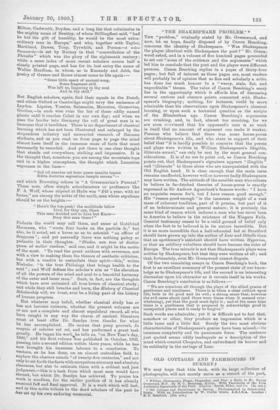" THE SHAKESPEARE PROBLEM." * THE "problem," originally stated by
Mr. Greenwood, and now, let us hope, finally disposed of by Canon Beeching, concerns the identity of Shakespeare. "Was Shakespeare the player identical with Shakespeare the poet F" Mr. Green- wood asked, and in a volume of five hundred pages proceeded to set out "some of the evidence and the arguments" which led him to conclude that the poet and the player were different persons. Canon Beeching replies in a paper of thirty-four pages; but full of interest as these pages are, most readers will probably be of opinion that so fine and scholarly a critic has done too much honour to a "weary, stale, flat, and unprofitable" theme, The value of Canon Beaching's essay lies in the opportunity which it affords him of discussing several curious and obscure points connected with Shake- speare's biography; nothing, for instance, could be more admirable than his observations upon Shakeepeare's classical learning, or upon such a technical question as the scripts of the Elizabethan age. Canon Beeching's arguments are crushing, and, in fact, almost too crushing, for we are soon convinced that his opponent's case is so weak in itself that no amount of argument can make it weaker.
Persons who believe that there was some hocus-pocus about Shakespeare's life, and who state in support of their belief that "it is hardly possible to conceive that the poems and plays were written in William Shakespeare's illegible, illiterate scrawl," can only be met by the most general con- siderations. It is of no use to point out, as Canon Beeching points out, that Shakespeare's signature appears " illegible " and "illiterate" to those alone who are unacquainted with the Old English hand. It is clear enough that the main issue remains unaffected, however well or however badly Shakespeare may have written. The attitude of the sensible man who refuses to believe in far-fetched theories of hocus-pocus is exactly expressed in Sir Andrew Aguecheek's famous words : "1 have no exquisite reason for't, but I have reason good enough." His "reason good enough" is the immense weight of a vast mass of coherent tradition, part of it precise, but part of it of an indeterminate and general nature; it is precisely the same kind of reason which induces a man who has never been to America to believe in the existence of the Niagara Falls. General testimony ceases to be a valid ground of belief only when the fact to be believed is in its nature incredible. But it is no more incredible that a half-educated lad at Stratford should have grown up into the author of Lear and Othello than that an apothecary's assistant should have written Hyperion, or that an artillery subaltern should have become the ruler of Europe. The true miracle is not that Shakespeare's plays were written by Shakespeare, but that they were written at all ; and that, fortunately, even Mr. Greenwood cannot dispute.
Of the two remaining essays in Canon Beeching's book, the first is an excellent summary of the present state of our know- ledge as to Shakespeare's life, and the second is an interesting discussion upon his character as it reveals itself in his works. Canon Beeching's conclusion is as follows :—
"We are conscious all through the plays of the allied graces of gentleness and manliness. There is in them a clear outlook upon life, both in its good and its evil; a strong sense that, however the evil came about (and there wore times when it seemed over- whelming), yet that the good must fight it ; and at the same time there is a gentleness that is prepared to acknowledge good in unexpected places and is ready to forgive."
Such words are admirable; yet it is difficult not to feel that, somehow or other, they produce an impression which is a little tame and a little flat. Surely the two most obvious characteristics of Shakespeare's genius have been missed,—its immense complexity and its passionate force. The sentence just quoted seems oddly inadequate as a description of the mind which created Cleopatra, and unburdened its horror and its sublimity in the ravings of Lear.
























































 Previous page
Previous page